ASP.NET Core分布式项目实战IdentityServer4登录中心oauth密码模式identity server4实现
Posted lonelyxmas
tags:
篇首语:本文由小常识网(cha138.com)小编为大家整理,主要介绍了ASP.NET Core分布式项目实战IdentityServer4登录中心oauth密码模式identity server4实现相关的知识,希望对你有一定的参考价值。
原文:【ASP.NET Core分布式项目实战】(一)IdentityServer4登录中心、oauth密码模式identity server4实现
本博客根据http://video.jessetalk.cn/my/course/5视频整理
资料
OAuth2 流程:http://www.ruanyifeng.com/blog/2014/05/oauth_2_0.html
博客园晓晨的关于identityServer4的中文文档地址: http://www.cnblogs.com/stulzq/p/8119928.html
Docker中文文档 https://yeasy.gitbooks.io/docker_practice/content/
OAuth2.0概念
OAuth2.0(Open Authorization)是一个开放授权协议;第三方应用不需要接触到用户的账户信息(如用户名密码),通过用户的授权访问用户资源
OAuth的步骤一般如下:
1、客户端要求用户给予授权
2、用户同意给予授权
3、根据上一步获得的授权,向认证服务器请求令牌(token)
4、认证服务器对授权进行认证,确认无误后发放令牌
5、客户端使用令牌向资源服务器请求资源
6、资源服务器使用令牌向认证服务器确认令牌的正确性,确认无误后提供资源
该协议的参与者至少包含:
RO (resource owner): 资源所有者:用户。
RS (resource server): 资源服务器:数据中心;它存储资源,并处理对资源的访问请求。如:API资源,相册服务器、博客服务器。
AS (authorization server): 授权服务器
Client: 第三方应用
四种模式:
1、授权码模式(authorization code)
2、简化模式(implicit)
3、密码模式(resource owner password credentials)
4、客户端模式(client credentials)
接下来我们使用客户端模式来实现一个IdentityServer4授权
客户端模式(Client Credentials Grant)
客户端模式(ClientCredentials):经常运用于服务器对服务器中间通讯使用;步骤如下:
1、客户端直接用自身的信息向授权服务器请求token:
HTTP请求:
granttype:授权类型
scope:授权范围
POST /token HTTP/1.1 Host: server.example.com Authorization: Basic czZCaGRSa3F0MzpnWDFmQmF0M2JW Content-Type: application/x-www-form-urlencoded grant_type=client_credentials&scope=api001
2、授权服务器验证信息后返回token
HTTP/1.1 200 OK Content-Type: application/json;charset=UTF-8 Cache-Control: no-store Pragma: no-cache { "access_token":"2YotnFZFEjr1zCsicMWpAA", "token_type":"example", "expires_in":3600, "example_parameter":"example_value" }

下面通过一个快速示例理解;快速示例将通过服务器与服务器直接通过api访问数据;
授权服务端
步骤:
添加Nuget包:IdentityServer4
添加Startup配置
添加Config.cs配置类
更改identity server4配置
添加客户端配置
第一步:添加Nuget包:IdentityServer4
首先,新建一个webapi项目 IdentityServerCenter
dotnet new webapi --name IdentityServerCenter
我们可以在vscode中使用ctrl+P键来打开命令面板。然后输入nuget按回车,输入identityserver4后按回车来选择版本进行安装
【注意:重新打开文件夹项目后才能在类中引用IdentityServer4有提示】
第二步:添加Startup配置
引用命名空间:
using IdentityServer4;
添加IdentityServer依赖注入
services.AddIdentityServer() .AddDeveloperSigningCredential();//添加开发人员签名凭据
app.UseIdentityServer();//使用IdentityServer
我们可以在Program.cs将当前api的地址设置成http://localhost:5000

第三步:添加Config.cs配置类
我们接下来添加一个Config.cs类,这个类是用来初始化IdentityServer的

using System.Collections; using System.Collections.Generic; using IdentityServer4; using IdentityServer4.Models; namespace IdentityServerCenter { public class Config { //所有可以访问的Resource public static IEnumerable<ApiResource> GetResources() { return new List<ApiResource> { new ApiResource("api","My Api") }; } //客户端 public static IEnumerable<Client> GetClients() { return new List<Client> { new Client() { ClientId="client", AllowedGrantTypes= GrantTypes.ClientCredentials,//模式:最简单的模式 ClientSecrets={//私钥 new Secret("secret".Sha256()) }, AllowedScopes={//可以访问的Resource "api" } } }; } } }
第四步:更改identity server4配置
services.AddIdentityServer() .AddDeveloperSigningCredential()//添加开发人员签名凭据 .AddInMemoryApiResources(Config.GetResources());//添加内存apiresource
第五步:添加客户端配置
services.AddIdentityServer() .AddDeveloperSigningCredential()//添加开发人员签名凭据 .AddInMemoryApiResources(Config.GetResources())//添加内存apiresource .AddInMemoryClients(Config.GetClients());//添加内存client
这是后我们执行dotnet run通过http://localhost:5000/.well-known/openid-configuration访问 ;可以看到是一个restful的api;

客户端集成IdentityServer
新建一个新的webapi,命名为ClientCredentialApi
dotnet new webapi --name ClientCredentialApi
给控制器添加引用Microsoft.AspNetCore.Authorization并添加 [Authorize] 标签
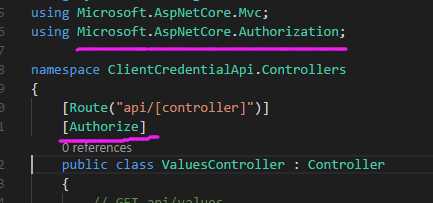
添加中间件IdentityServer4.AccessTokenValidation 包引用

配置api的地址 http://localhost:5001

添加授权DI注入
services.AddAuthentication("Bearer")//添加授权模式 .AddIdentityServerAuthentication(Options=>{ Options.Authority="http://localhost:5000";//授权服务器地址 Options.RequireHttpsMetadata=false;//是否是https Options.ApiName="api"; });
app.UseAuthentication();//使用授权中间件
这时候执行 dotnet run进行访问http://localhost:5001/api/values
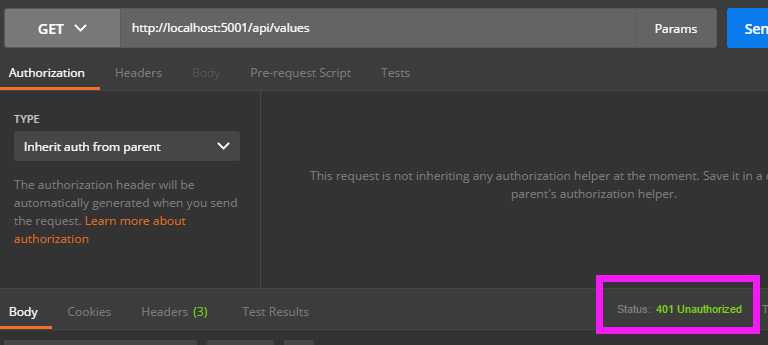
这时候我们运行之前的IdentityServerCenter通过http://localhost:5000/.well-known/openid-configuration访问 ,来拿到获取token的地址 http://localhost:5000/connect/token
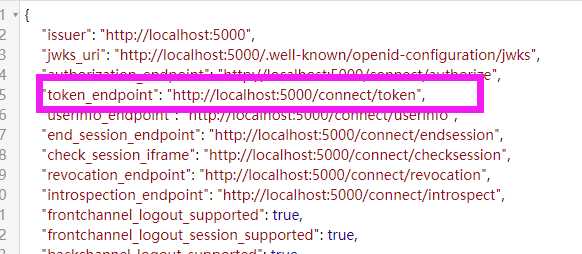
我们接下来使用postman来获取一下token,请求参数
client_id、client_secret、grant_type
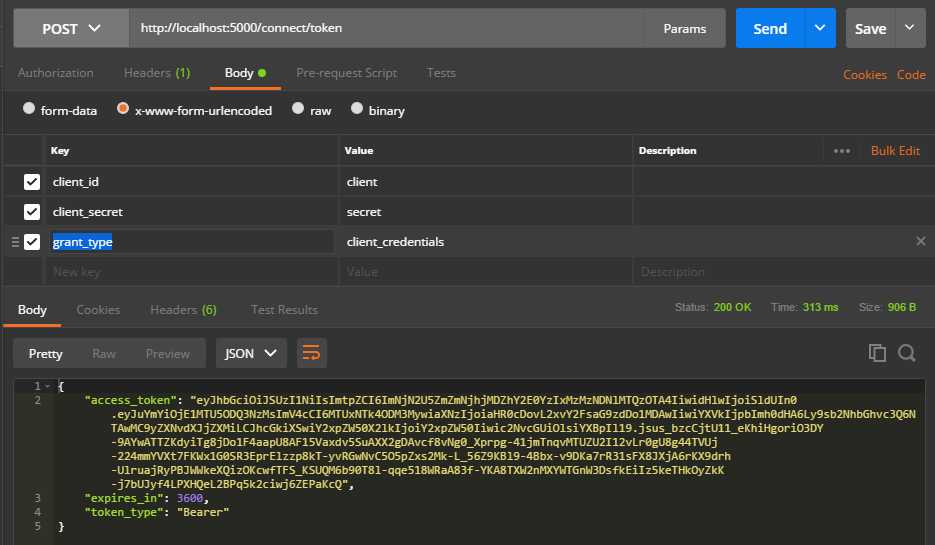
这样我们拿到token后,再去访问ClientCredentialApi(成功)
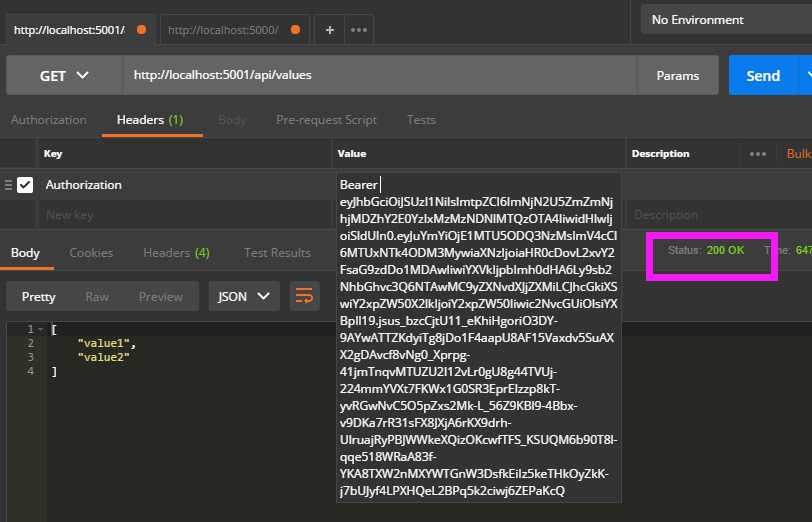
控制台获取token
新建一个控制台ThirdPartyDemo
dotnet new console --name ThirdPartyDemo
添加添加nuget引用包 IdentityModel

using System; using System.Net.Http; using IdentityModel.Client; namespace ThirdPartyDemo { class Program { static void Main(string[] args) { var dico = DiscoveryClient.GetAsync("http://localhost:5000").Result; //token var tokenClient = new TokenClient(dico.TokenEndpoint, "client", "secret"); var tokenResponse = tokenClient.RequestClientCredentialsAsync("api").Result; if (tokenResponse.IsError) { Console.WriteLine(tokenResponse.Error); return; } Console.WriteLine(tokenResponse.Json); Console.WriteLine("\\n\\n"); var httpClient = new HttpClient(); httpClient.SetBearerToken(tokenResponse.AccessToken); var response = httpClient.GetAsync("http://localhost:5001/api/values").Result; if (!response.IsSuccessStatusCode) { Console.WriteLine(response.Content.ReadAsStringAsync().Result); } Console.ReadLine(); } } }
DiscoveryClient类:IdentityModel提供给我们通过基础地址(如:http://localhost:5000)就可以访问令牌服务端;当然可以根据上面的restful api里面的url自行构建;上面就是通过基础地址,获取一个TokenClient;(对应restful的url:token_endpoint "http://localhost:5000/connect/token")
RequestClientCredentialsAsync方法:请求令牌;
获取令牌后,就可以通过构建http请求访问API接口;这里使用HttpClient构建请求,获取内容;
运行效果:

oauth密码模式identity server4实现
1、Config.cs添加用户的配置
2、添加client的配置
3、修改Startup.cs
Config.cs添加用户的配置
添加测试用户,并给其用户名密码(其他Claim);TestUser是IdentityServer给我们的测试抽象用户类;实际可自行定义
TestUser类型表示一个测试用户及其身份信息。让我们向配置类(如果你有严格按照顺序进行演练,那么配置类应该在 QuickstartIdentityServer 项目的 Config.cs 文件中)中添加以下代码以创建一对用户:
首先添加以下语句 到Config.cs文件中:
//测试用户 public static List<TestUser> GetTestUsers() { return new List<TestUser>{ new TestUser{ SubjectId="1", Username="wyt", Password="123456" } }; }
添加client的配置
添加一个客户端
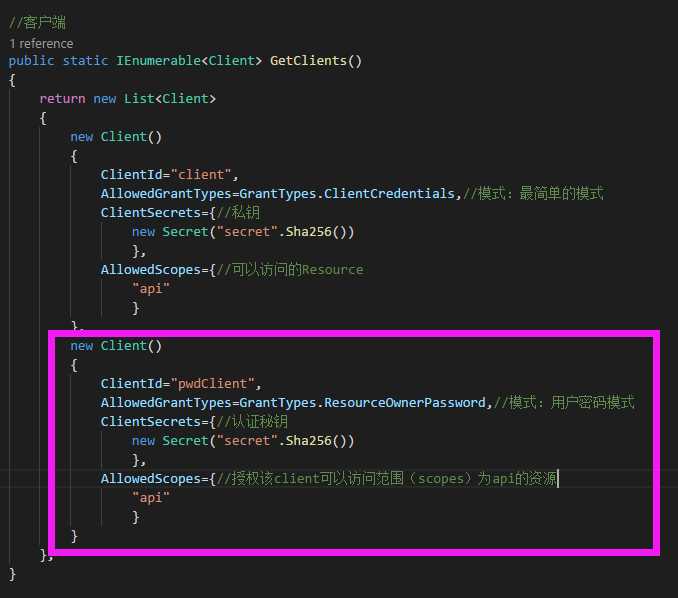
修改Startup.cs
这里AddTestUser会给授权服务端增加各类支持用户(RO)的密码支持
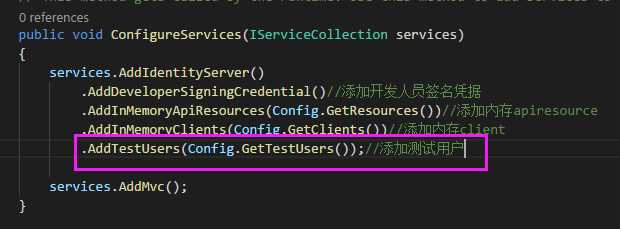
我们接下来使用postman来获取一下账号密码模式token,请求参数【注意:这里必须要使用x-www-form-urlencoded的请求方式,否则无法获取token】
client_id、client_secret、grant_type、username、password
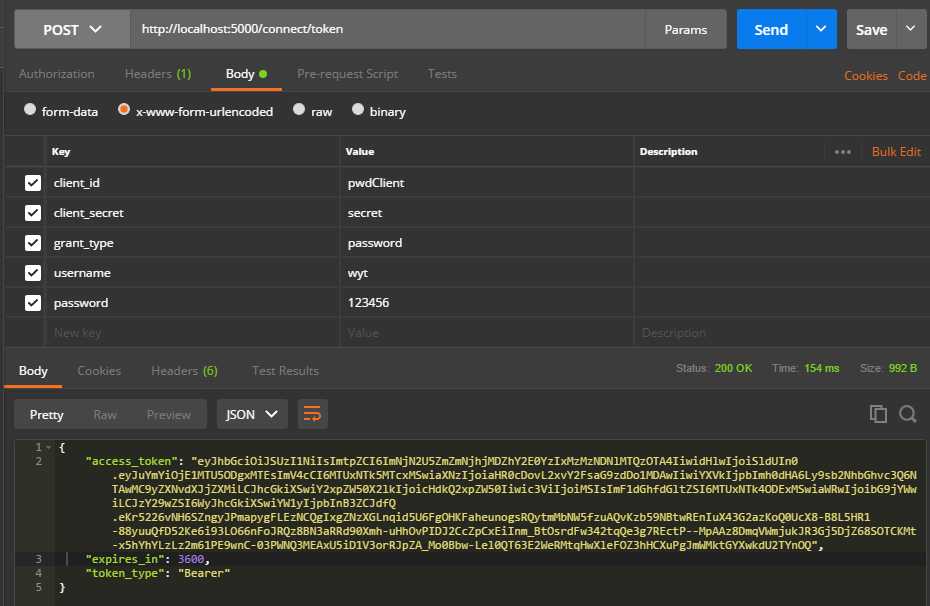
完成~~~
控制台请求获取token
新建一个控制台PwdClient
dotnet new console --name PwdClient
添加添加nuget引用包 IdentityModel

using System; using System.Net.Http; using IdentityModel.Client; namespace PwdClient { class Program { static void Main(string[] args) { var dico = DiscoveryClient.GetAsync("http://localhost:5000").Result; //token var tokenClient = new TokenClient(dico.TokenEndpoint, "pwdClient", "secret"); var tokenResponse = tokenClient.RequestResourceOwnerPasswordAsync("wyt","123456").Result; if (tokenResponse.IsError) { Console.WriteLine(tokenResponse.Error); return; } Console.WriteLine(tokenResponse.Json); Console.WriteLine("\\n\\n"); var httpClient = new HttpClient(); httpClient.SetBearerToken(tokenResponse.AccessToken); var response = httpClient.GetAsync("http://localhost:5001/api/values").Result; if (!response.IsSuccessStatusCode) { Console.WriteLine(response.Content.ReadAsStringAsync().Result); } Console.ReadLine(); } } }
运行效果:

如果信任的第三方,不想加入密码,可以在授权服务的Config.cs中Client添加设置RequireClientSecret=false即可
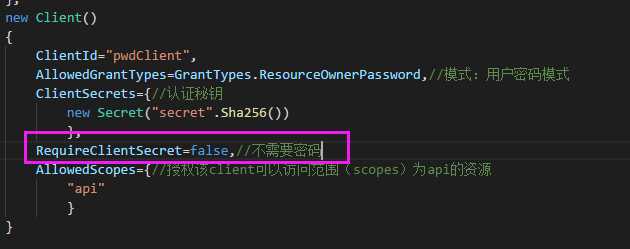
以上是关于ASP.NET Core分布式项目实战IdentityServer4登录中心oauth密码模式identity server4实现的主要内容,如果未能解决你的问题,请参考以下文章
ASP.NET Core分布式项目实战整理IdentityServer4 MVC授权Consent功能实现
ASP.NET Core分布式项目实战IdentityServer4登录中心oauth密码模式identity server4实现
无私分享:ASP.NET CORE 项目实战(第十二章)添加对SqlServerMySqlOracle的支持
ASP.NET Core 实战:使用 ASP.NET Core Web API 和 Vue.js 搭建前后端分离项目
